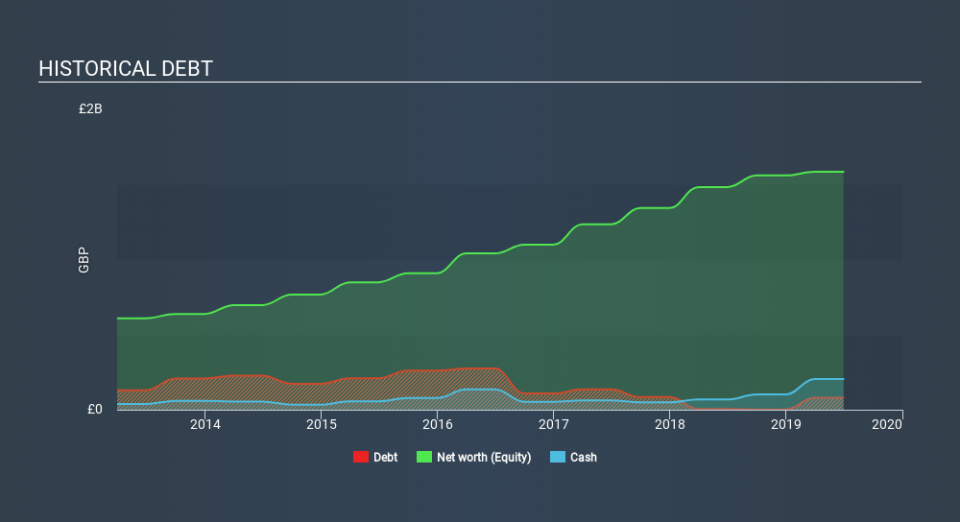Is Redrow (LON:RDW) Using Too Much Debt?

Howard Marks put it nicely when he said that, rather than worrying about share price volatility, 'The possibility of permanent loss is the risk I worry about... and every practical investor I know worries about. So it might be obvious that you need to consider debt, when you think about how risky any given stock is, because too much debt can sink a company. We note that Redrow plc (LON:RDW) does have debt on its balance sheet. But should shareholders be worried about its use of debt?
Why Does Debt Bring Risk?
Debt assists a business until the business has trouble paying it off, either with new capital or with free cash flow. If things get really bad, the lenders can take control of the business. However, a more common (but still painful) scenario is that it has to raise new equity capital at a low price, thus permanently diluting shareholders. Having said that, the most common situation is where a company manages its debt reasonably well - and to its own advantage. The first step when considering a company's debt levels is to consider its cash and debt together.
See our latest analysis for Redrow
What Is Redrow's Net Debt?
As you can see below, at the end of June 2019, Redrow had UK£80.0m of debt, up from UK£5.0 a year ago. Click the image for more detail. But it also has UK£204.0m in cash to offset that, meaning it has UK£124.0m net cash.
How Strong Is Redrow's Balance Sheet?
Zooming in on the latest balance sheet data, we can see that Redrow had liabilities of UK£760.0m due within 12 months and liabilities of UK£259.0m due beyond that. Offsetting this, it had UK£204.0m in cash and UK£47.0m in receivables that were due within 12 months. So its liabilities total UK£768.0m more than the combination of its cash and short-term receivables.
This deficit isn't so bad because Redrow is worth UK£2.72b, and thus could probably raise enough capital to shore up its balance sheet, if the need arose. But it's clear that we should definitely closely examine whether it can manage its debt without dilution. While it does have liabilities worth noting, Redrow also has more cash than debt, so we're pretty confident it can manage its debt safely.
The good news is that Redrow has increased its EBIT by 7.6% over twelve months, which should ease any concerns about debt repayment. There's no doubt that we learn most about debt from the balance sheet. But it is future earnings, more than anything, that will determine Redrow's ability to maintain a healthy balance sheet going forward. So if you want to see what the professionals think, you might find this free report on analyst profit forecasts to be interesting.
Finally, a business needs free cash flow to pay off debt; accounting profits just don't cut it. While Redrow has net cash on its balance sheet, it's still worth taking a look at its ability to convert earnings before interest and tax (EBIT) to free cash flow, to help us understand how quickly it is building (or eroding) that cash balance. During the last three years, Redrow produced sturdy free cash flow equating to 55% of its EBIT, about what we'd expect. This cold hard cash means it can reduce its debt when it wants to.
Summing up
Although Redrow's balance sheet isn't particularly strong, due to the total liabilities, it is clearly positive to see that it has net cash of UK£124.0m. So we don't have any problem with Redrow's use of debt. The balance sheet is clearly the area to focus on when you are analysing debt. However, not all investment risk resides within the balance sheet - far from it. Take risks, for example - Redrow has 2 warning signs we think you should be aware of.
If you're interested in investing in businesses that can grow profits without the burden of debt, then check out this free list of growing businesses that have net cash on the balance sheet.
If you spot an error that warrants correction, please contact the editor at editorial-team@simplywallst.com. This article by Simply Wall St is general in nature. It does not constitute a recommendation to buy or sell any stock, and does not take account of your objectives, or your financial situation. Simply Wall St has no position in the stocks mentioned.
We aim to bring you long-term focused research analysis driven by fundamental data. Note that our analysis may not factor in the latest price-sensitive company announcements or qualitative material. Thank you for reading.



